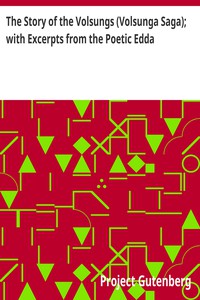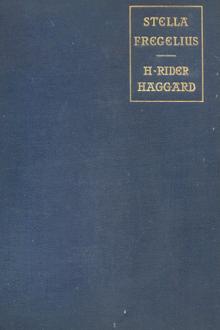The Story of the Volsungs (Volsunga Saga); with Excerpts from the Poetic Edda, - [e book reading free .txt] 📗

- Author: -
Book online «The Story of the Volsungs (Volsunga Saga); with Excerpts from the Poetic Edda, - [e book reading free .txt] 📗». Author -
In politics the homestead, with its franklin-owner, was the unit; the "thing", or hundred-moot, the primal organisation, and the "godord", or chieftainship, its tie. The chief who had led a band of kinsmen and followers to the new country, taken possession of land, and shared it among them, became their head-ruler and priest at home, speaker and president of their Thing, and their representative in any dealings with neighbouring chiefs and their clients. He was not a feudal lord, for any franklin could change his "godord" as he liked, and the right of "judgment by peers" was in full use. At first there was no higher organisation than the local thing. A central thing, and a speaker to speak a single "law" for the whole island, was instituted in 929, and afterwards the island was divided in four quarters, each with a court, under the Al-thing. Society was divided only into two classes of men, the free and unfree, though political power was in the hands of the franklins alone; "godi" and thrall ate the same food, spoke the same tongue, wore much the same clothes, and were nearly alike in life and habits. Among the free men there was equality in all but wealth and the social standing that cannot be separated therefrom. The thrall was a serf rather than a slave, and could own a house, etc., of his own. In a generation or so the freeman or landless retainer, if he got a homestead of his own, was the peer of the highest in the land. During the tenth century Greenland was colonised from Iceland, and by end of the same century christianity was introduced into Iceland, but made at first little difference in arrangements of society. In the thirteenth century disputes over the power and jurisdiction of the clergy led, with other matters, to civil war, ending in submission to Norway, and the breaking down of all native great houses. Although life under the commonwealth had been rough and irregular, it had been free and varied, breeding heroes and men of mark; but the "law and order" now brought in left all on a dead level of peasant proprietorship, without room for hope or opening for ambition. An alien governor ruled the island, which was divided under him into local counties, administered by sheriffs appointed by the king of Norway. The Al-thing was replaced by a royal court, the local work of the local things was taken by a subordinate of the sheriff, and things, quarter-courts, trial by jury, and all the rest, were swept away to make room for these "improvements", which have lasted with few changes into this century. In 1380 the island passed under the rule of Denmark, and so continues. (9) During the fifteenth century the English trade was the only link between Iceland and the outer world; the Danish government weakened that link as much as it could, and sought to shut in and monopolise everything Icelandic; under the deadening effect of such rule it is no marvel that everything found a lower level, and many things went out of existence for lack of use. In the sixteenth century there is little to record but the Reformation, which did little good, if any, and the ravages of English, Gascon, and Algerine pirates who made havoc on the coast; (10) they appear toward the close of the century and disappear early in the seventeenth. In the eighteenth century small-pox, sheep disease, famine, and the terrible eruptions of 1765 and 1783, follow one another swiftly and with terrible effect. At the beginning of the present century Iceland, however, began to shake off the stupor her ill-hap had brought upon her, and as European attention had been drawn to her, she was listened to. Newspapers, periodicals, and a Useful Knowledge Society were started; then came free trade, and the "home-rule" struggle, which met with partial success in 1874, and is still being carried on. A colony, Gimli, in far-off Canada, has been formed of Icelandic emigrants, and large numbers have left their mother-land; but there are many co-operative societies organised now, which it is hoped will be able to so revive the old resources of the island as to make provision for the old population and ways of life. There is now again a representative central council, but very many of the old rights and powers have not been yet restored. The condition of society is peculiar absence of towns, social equality, no abject poverty or great wealth, rarity of crime, making it easy for the whole country to be administered as a co-operative commonwealth without the great and striking changes rendered necessary by more complicated systems.
Iceland has always borne a high name for learning and literature; on both





Comments (0)